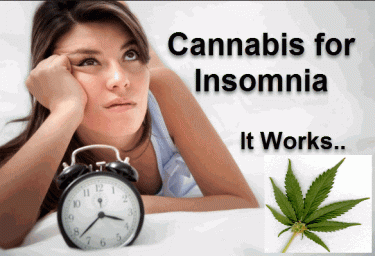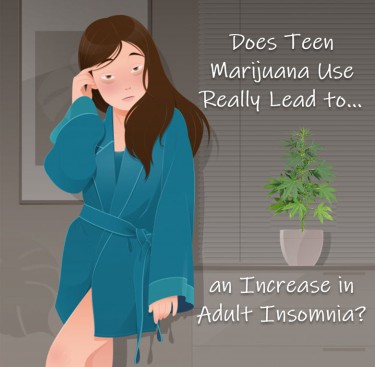
Can not sleep? – Advanced techniques to treat insomnia
Many people use cannabis to help them fall asleep. For some, it’s the only way to drift off into the underworld. I too suffered from this condition for the longest time, lying awake staring at the roof and counting the minutes that passed. Cannabis helped me tremendously through the roughest parts of my insomnia-stricken years, but it wasn’t the only thing that helped me eventually get to a point where I could pass out without the substance.
In today’s article we take a closer look at some of the best strategies that have worked for me, starting with cannabis.
What are the main reasons for insomnia?
First, let’s take a closer look at the reasons why people suffer from insomnia. According to the Sleep Foundation, “Common causes of insomnia include stress, an irregular sleep pattern, poor sleeping habits, mental disorders such as anxiety and depression, physical illness and pain, medications, neurological problems, and specific sleep disorders. In many people, a combination of these factors can trigger and worsen insomnia.”
Nonetheless, it is believed that insomnia is a direct result of “overarousal.” This essentially means that the sympathetic nervous system is on full alert. Hyperarousal is often associated with PTSD. Essentially, your mind is stuck in the “fight/flight/fear/fold” state, which does not allow you to enter the rest/digestion state caused by activation of the parasympathetic nervous system.
This is a rather simplistic view, however, as in my case I didn’t suffer from “hyperarousal” in the same sense that a PTSD sufferer would. In fact, my mind just wouldn’t turn off. I would think about the most random things like “how do they make sausages” and try desperately to find the answer any way I could. This is of course very subjective, but at least this should give us some basis to deal with insomnia.
Now – how to beat it!
Cannabis for insomnia
Cannabis has long been my medicine of choice for a variety of ailments. However, when it came to insomnia, smoking weed wasn’t enough. In fact, I found that edibles were the most effective way of helping me fall asleep. When I smoked weed (during my insomnia years) I would usually think about random things until the early hours. Conversely, edibles could make me pass out – I slept the whole evening. Different strains for insomnia may also affect other users differently.
The main issue with edibles has been dosage. Over time, my tolerance for the edibles increased, which meant I had to take larger doses. The problem with this is finding the sweet spot. Take too little and I would lie awake at night, take too much and feel light headed in the morning. The drowsiness was minimal, but it was there. Not to mention the several mornings I woke up with a cotton ball. Many people choose CBD because you can’t really experience the drowsiness of too much THC and because it’s a natural neurocontroller and helps bring the body back to homeostasis.
Recent studies have said that vaping raw cannabis flower is the best ingestion method for treating insomnia, but I haven’t tried it personally.
Tincture or edible, cannabis is definitely a sleep aid. However, I always try to solve the problem without external intervention first, and interestingly – when I tried these other tactics in combination with cannabis – I finally started to see the desired results.
Do some sports!
Probably one of the best things you can do for your overall health is to be active. This means not only going for a walk every now and then (which is also good for your health), but a daily exercise program. Whether it’s cycling, jogging, going to the gym, etc., all of these activities help reduce stress, increase bodily functions like blood pressure and blood flow, improve cardiovascular activity, etc.
I started boxing, which helped me significantly reduce stress. After the first few sessions I could feel my sleep getting easier, but it wasn’t the last nail in the coffin.
Stretch!
Yoga has been by far one of the best things I’ve discovered to help me fight insomnia. It wasn’t as cardiovascularly intense as boxing, but it released tension from my body like no other exercise. It took me all but two sessions to fall in love with yoga completely, and I recommend everyone to pick it up, even if you do other practices. The benefits of yoga are endless, from improved flexibility to a significant reduction in stress. Yoga is “mind” as well as “body,” and often insomnia is a direct result of something being “off” in both of these spheres.
Meditate!
My head was full of random thoughts hovering just below the surface. It wasn’t until I started meditating more regularly that I was able to free myself from these thoughts. When I failed to meditate, these thoughts would visit me at night – however, 10-20 minutes of meditation allowed me to clear the mental “cache” which created a stillness in my head that helped me fall asleep faster. When I’m not thinking about stupid things, falling asleep is infinitely easier for me.
breathwork
This is probably the activity that had the greatest impact on my insomnia. When I understood that the breath is a key tool to shift from sympathetic to parasympathetic states, I learned how to turn my mind off by changing the way I breathe. Mix this with binaural beats and you have a match made in heaven.
If this interests you, I can recommend the 4-7-8 breathing method. Essentially, you breathe in for 4 seconds, hold your breath for 7 seconds, and breathe out for 8 seconds. You repeat this for about 10 minutes and by the end of the time frame you would either be asleep or very close.
If you want more breathwork activities to help you reach different states, you can check out this Youtube channel to learn more. The canal offers many different techniques for you to explore.
Wake up early!
Another trick that worked like a charm was to “become a morning person.” Often people with insomnia identify as “night owls,” but when you set yourself the painful task of forcing yourself to get up super early, your body eventually switches. Granted, it can take a week for you to feel awful and tired all day — but if you suffer from insomnia, you’re used to it by now.
Conclusion
As I started taking care of my mental and physical health, my insomnia started to subside. I still use cannabis at the end of the day to create a disconnect from my work, but if I don’t smoke cannabis – it doesn’t matter anymore.
I can always breathe myself to sleep if I need to.
CAN’T SLEEP, TRY CANNABIS, READ MORE…

CANNABIS AGAINST INSOMNIA AND SLEEP WHY IT WORKS SO WELL!
OR..

DOES TEENAGE MARIJUANA CAUSE ADULT INSOMNIA?

Post a comment: